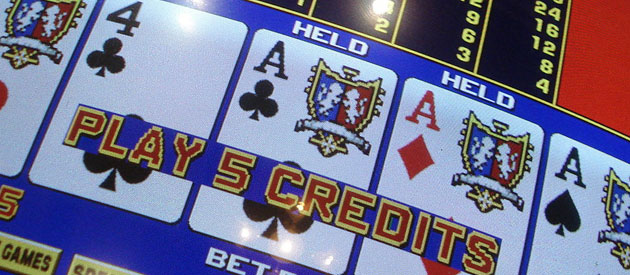Video Poker Tutorial

Video poker is one of the most popular games in casinos but it isn’t always easy to find the machines in Vegas, at least not on The Strip. Head to one of the neighborhood casinos, where locals play, and you’ll find a lot more video poker action.
In the game, you are dealt a standard five-card poker hand on a video screen and then you get one chance to draw cards to improve your hand. If you’re unfamiliar with poker hands check out the chart on the right side of this page for reference.
Most video poker machines use a standard 52-card deck for each hand dealt. This means that in most cases you will not be able to discard a four of diamonds (for instance) and get the four of diamonds back in your draw. Additionally, since each hand is a fresh deck, you can’t “use up” good cards in previous hands.
The actual functionality of a video poker machine varies from manufacturer to manufacturer but the bulk of them work with a similar concept to a slot machine. A computer chip sits there randomly “shuffling” a virtual deck of cards constantly. Every millisecond there is a new order of the 52 cards in that virtual deck and when you put a coin in the “shuffling” stops. Whatever order those cards are in is the selection you will get when you push the “Deal” button.
The bulk of video poker machines take the first ten cards from that virtual deck and put them in order in a queue. The first five are displayed and you get the chance to hold or discard as many as you want. The machine will then take the next cards from the deck in order to replace the ones you’ve discarded. Therefore if you discard three of the first five cards, you’ll get the next three cards in the queue no matter which three cards you got rid of.
For instance, let’s say the ten cards in the queue are the following in this order:




















Now, let’s pretend instead of the pair of fours you decide to keep the King and the Jack from your original hand. You hit the discard button and you’ll get the same three cards you got in the scenario above because they are the next ones in the queue. You wind up with:





As with slot machines, the varieties in themes are almost endless. There are machines that accept everything from nickels to $100 tokens (and more) although nickel, dime, quarter, and dollar machines are the most prevalent. Most accept anywhere from one to five coins (of whatever denomination you are playing) and payouts vary accordingly.
By the way, when I speak of types of coins, I’m speaking in terms of a monetary unit and not actual coins. Most modern slot and video poker machines do not accept or payout in real coins anymore. They have mostly been replaced with a system that accepts bills of various denominations and pays out with a paper ticket that can be put in another machine or redeemed at the cashier window or change booth. Casual gamblers miss the rain of coins into the metal bin but most people have embraced the new system as easier, cleaner, and more convenient.
Most machines have set, or flat-top, jackpots meaning that if you get a royal flush you will win the same amount every time. There are some progressive jackpot machines, which work like your local lottery. As people pump more money into it, the top jackpot grows until somebody gets the correct combination. Most are linked to a group of machines in the casino or even around the city or state.
Video poker machines are often referred to by the payouts you win if you get a Full House and Flush. For instance, a machine that pays eight coins for every one bet for a full house and five coins for every one bet for a flush is usually called an 8/5 machine. These are the most common, however there are still a few 9/6 and even 10/7 machines out there and they are often worth looking for. It’s obvious that you get more money if you win but in addition, legend has it that these machines pay off better than the 8/5 machines – although in practice it’s all about the luck of the draw.
The typical machine requires that you get “jacks or better” to win anything, meaning you must get at least a pair of jacks to get paid, but again, there are a million variations on the theme. Here are just a few:
Deuces or Jokers Wild
Some video poker machines offer wild cards (such as deuces or jokers) and these usually require you to get at least three-of-a-kind before you’ll win anything.
Bonus Poker
The Bonus Poker series includes standard Bonus Poker, Double Bonus Poker, Triple Bonus Poker, and more. These machines pay extra coins for certain combinations not usually found on a standard video poker machine. The most common are bonuses for four-of-a-kind 2s, 3s, 4s, or Aces and some offer even higher payouts for “kicker” cards such as four-of-a-kind 2s with the fifth card being an Ace. Study the payout table on the machine before you play.
Multi-Hand Poker
With these machines you are dealt anywhere from three to fifty unique poker hands from separate decks. Only one of the hands is dealt face up and when you select the cards you want to hold those cards are copied onto all of the hands on the screen. The machine then deals you new and unique cards for each hand allowing you the possibility of winning on some and losing on others.
Reel Poker
Similar to multi-hand poker, these machines feature a slot-machine style video reel for the additional hands (usually three total). The cards you hold are copied to the other reels and then you “spin” to see what you get and if you’ve won or lost on all of the hands you are playing. The hands are unique so you may win on some and lose on others.
Double Down
Double Down machines offer you a chance to double your money if you win. After playing a standard poker hand, the screen will ask you if you want to Double Down. If you choose “Yes” you’ll be dealt one card face up and four down. Your goal is to pick one of the face down cards and hope it is higher than the face up card. If it is, you win double your money. If not, you lose it all. These machines will usually allow you to keep doubling until you quit or until you lose, whichever comes first.
